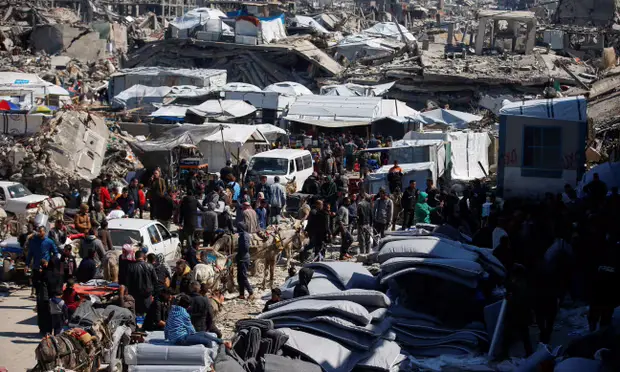The recent Israeli decision to block humanitarian aid to Gaza has led to severe concerns about the health of its population, particularly as it grapples with widespread food insecurity, destroyed infrastructure, and deteriorating medical conditions. The health crisis in Gaza has now reached alarming levels, with over two million Palestinians, including children and the elderly, facing dire consequences as aid remains severely restricted.
The Impact of the Blockade
In early March 2025, the Israeli government made the controversial decision to turn off the aid supply to Gaza. This action was purportedly based on claims that Gaza had months’ worth of food stockpiled from earlier aid deliveries. However, the reality on the ground tells a different story. According to aid agencies, the population of Gaza is already highly vulnerable, with food prices in the region surging by as much as 100% after the blockade was enforced. Basic essentials have become unaffordable for many families, exacerbating the suffering of a population already reeling from the effects of war and an ongoing humanitarian crisis.
Oxfam, a leading global humanitarian organization, condemned Israel’s actions, calling the blockade “a reckless act of collective punishment” that violates international humanitarian law. The organization stressed that Israel, as the occupying power, has a legal and moral responsibility to allow the flow of aid to the civilian population of Gaza. This blockade has become a focal point of debate in the international community, particularly in light of Israel’s ongoing military operations in Gaza, which have decimated the region’s infrastructure and left much of its population in a state of desperation.
The International Response
The international community has been vocal in its condemnation of Israel’s actions. In response to an allegation of genocide brought against Israel, the International Court of Justice issued a ruling instructing Israel to facilitate the delivery of aid to Gaza. The court noted that there were substantial concerns regarding the use of starvation as a method of warfare by Israeli forces. Despite Israel’s consistent denials of these allegations, the situation in Gaza continues to deteriorate, with aid deliveries only partially addressing the massive need.
The United Nations Office for the Coordination of Humanitarian Affairs (OCHA) reported that approximately 876,000 Palestinians in Gaza are experiencing emergency levels of food insecurity, with 345,000 people facing catastrophic food insecurity. The blockade has led to severe delays in the delivery of essential food, medical supplies, and clean water, further exacerbating the crisis.
Gaza’s Vulnerability and the Humanitarian Crisis
The health situation in Gaza is nothing short of catastrophic. With nearly 70% of the buildings in Gaza destroyed or severely damaged, the region is facing an unprecedented level of destruction. Hospitals, schools, and homes have been wiped out, leaving civilians without adequate shelter or access to basic services. Oxfam has described the limited aid deliveries as “a drop in the ocean,” given the scale of destruction and the needs of the population.
One of the most pressing concerns is the lack of adequate healthcare infrastructure. The World Health Organization (WHO) has reported that 80% of Gaza’s healthcare facilities have been destroyed, with approximately 1,000 medical workers killed during the conflict. Additionally, WHO estimates that 14,000 Palestinians, including 4,500 children, are in need of urgent medical evacuation due to the lack of adequate medical care in Gaza.
The destruction of Gaza’s healthcare system has left residents vulnerable to a wide range of diseases and health conditions. Health experts have raised alarms about the spread of infectious diseases due to poor sanitation, the lack of clean drinking water, and the overflow of sewage in the streets. In Gaza City alone, there are approximately 180,000 tons of solid waste that have been left untreated because Israel has blocked efforts to remove the waste. This has led to a sanitation crisis, with sewage flowing in the streets, exacerbating the spread of disease and increasing the risk of waterborne illnesses.
Food Insecurity and Malnutrition
Malnutrition is one of the most significant health risks facing Gaza’s population. Aid agencies report that the blockade has made it increasingly difficult for residents to access nutritious food, leading to widespread malnutrition, particularly among children. The UN’s latest reports show that millions of people in Gaza are facing food shortages, and many have resorted to eating whatever they can find, even if it lacks nutritional value.
According to experts, the impact of food insecurity on Gaza’s population cannot be overstated. Malnutrition, especially among children, can have long-term effects on physical and cognitive development. The lack of adequate nutrition increases the risk of stunted growth, weakened immune systems, and a higher susceptibility to disease. With the ongoing blockade preventing the entry of vital food supplies, the situation is becoming increasingly desperate, with aid agencies warning that the population is at risk of starvation.
The Role of the Ceasefire Agreement
Under the terms of a ceasefire agreement, approximately 600 trucks per day have been allowed to cross into Gaza, carrying a total of 57,000 tons of food. While this is an improvement compared to the period before the ceasefire, aid agencies argue that it is insufficient given the scale of the disaster. The aid that has reached Gaza during the six-week ceasefire period has been described as a small fraction of what is needed to address the full extent of the crisis. Much of the aid that has entered Gaza has been tightly controlled by Israeli authorities, with medical supplies, water tankers, and other essential items blocked from entering.
In addition to the blockade on aid, the ongoing conflict has disrupted the agricultural sector in Gaza, making it even harder for the population to rely on locally produced food. The destruction of farmlands, the loss of livestock, and the disruption of food distribution networks have all contributed to the worsening food insecurity in the region. Without the means to produce their own food and with limited access to external supplies, Gaza’s residents are facing a severe and ongoing food crisis.
The Humanitarian Crisis Continues
The humanitarian crisis in Gaza is far from over. As Israel continues its blockade on aid, the situation is expected to worsen, with thousands more deaths anticipated due to hunger and related diseases. Plan International, a global development organization, has warned that without a significant increase in humanitarian aid, many more people will die in the coming weeks and months. Thousands of children, already malnourished and vulnerable, are at particular risk.
As international aid organizations continue to push for unrestricted access to Gaza, there are calls for stronger action from the global community. The United Nations, along with other international bodies, has called on Israel to lift the blockade and allow the free flow of humanitarian assistance into Gaza. Human rights groups have urged world leaders to hold Israel accountable for its actions, which they believe constitute a violation of international law.
The situation in Gaza is a dire human rights crisis that requires urgent action from the international community. As the health of the population continues to deteriorate, aid agencies are calling for a sustained and unhindered flow of humanitarian supplies into the region. The international community must take action to ensure that Gaza’s residents have access to the food, water, and medical care they desperately need.
In addition to immediate aid, there is a need for long-term solutions to address the underlying causes of the humanitarian crisis in Gaza. This includes efforts to rebuild the region’s infrastructure, improve access to healthcare and education, and provide the resources necessary for sustainable development. The people of Gaza have suffered for too long, and it is essential that the international community steps up to provide the support they need to rebuild their lives.
As the health crisis deepens in Gaza, the world must act with urgency and compassion to ensure that aid reaches those who need it most. The ongoing blockade on humanitarian aid is causing unnecessary suffering and must be lifted to allow the people of Gaza to receive the assistance they deserve. The health and well-being of millions of innocent civilians depend on it.























